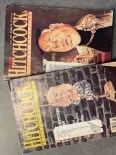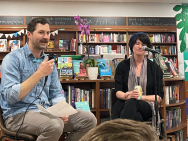CAN THE WRITING BRAIN BE TRAINED?
blogged by Jule Selbo

This is kind of jumping off from Shelley Burbank’s guest posting on Tuesday. Not on purpose – but when I read her blog – I thought – ahh! Minds in the same place!
My very first “writing sale” was to Alfred Hitchcock Mystery Magazine. I was in my early twenties and since childhood, I’d always picked up the small publication at various libraries or bookstores and read its stories. I can’t remember what made me decide to sit down and try my hand at writing one. I’ve tried to climb into the deep-memory state (lay down and let your mind go, Jule) or (take a walk, Jule, and some brain-pictures of the time might show themselves) but so far, no luck. I was totally into writing plays at the time – pretty silly ones because it was hard for me, in my twenties, to reveal I might have a few serious thoughts, worries, frustrations, wonderings. (Shameful now, in retrospect, that my self-confidence was so low and my cowardice so high).
But sit down I must have done. I’d just moved to NYC, so did I write them at the Greek Coffeeshop on the corner of Broadway and 72nd? At a long table in the NYC Public Library? Or at my pay-the-rent job in midtown Manhattan, in between trying to convince, via telephone, medical professionals to sign up for chat-and-sell sessions on the latest pharmaceutical marvels?
What I do remember is that they came from some part of my brain that was un-educated in the form (except for being an avid reader). And that it was fun. Fast. And somehow I had dipped into a junior high and high school “character voice”. And, until I got the acceptance and the paltry (I didn’t care) payment, I had no idea how cool it was to have a short story accepted by a publication.
I haven’t written a short story since. I have written short plays (10-minute, 20-minute plays are the most viable), short screenplays (11 to 12 minutes for the TV screen) but haven’t done anymore short prose. I think my short story career must have been halted when I was hired to write for a daytime soap and two night-time horror anthology shows (George Romero’s Tales from the Darkside and Monsters…
 …in essence they were stand-alone 30 minute film stories so the short form was still there but…) – and writing just for “fun” had to be put aside.
…in essence they were stand-alone 30 minute film stories so the short form was still there but…) – and writing just for “fun” had to be put aside.
 Now thinking about going from writing long-form novels to experimenting with the short form again – I know my brain will take some re-training. I’ll have to lose some character complexity and my love of creating lots of obstacles and twists and turns. The point (as I think I see it, but ready for some edifying) of the short forms is to concentrate more on a single goal, a smaller cast of strong characters and maybe only one or two obstacles. Nuanced set-ups need to be put aside, and the pieces may often (must?) start in the “middle of the problem”.
Now thinking about going from writing long-form novels to experimenting with the short form again – I know my brain will take some re-training. I’ll have to lose some character complexity and my love of creating lots of obstacles and twists and turns. The point (as I think I see it, but ready for some edifying) of the short forms is to concentrate more on a single goal, a smaller cast of strong characters and maybe only one or two obstacles. Nuanced set-ups need to be put aside, and the pieces may often (must?) start in the “middle of the problem”.

QUESTION: For the short story writers out there – do you find yourself starting at the inciting incident? Or in the middle of the conflict (like looking at the dead body)? If set-ups are necessary – are they, in the short story form, truncated?
This desire to work in the form again has been a whisper in my ear for a few months, it’s now becoming a louder directive. Don’t know why – but it’s probably because I’m deep into the frustrating middle of 8 DAYS, A Dee Rommel Mystery, and I’ve been longing to have something completed. My friend, Anne Elliott (South Portland) is a great short story writer and I read her stuff all the time and marvel at the succinct, literary set-ups and twists and completions (on average in about ten pages). She’s not writing crime/mysteries but tension and the reader’s “what’s gonna happen next” is definitely tweaked.
On the MWP site, I read about a short story read-and-talk taking place at Back Cove Books. I attended it last week. A.J. Bermudez and Josh Bodwell were presiding and
 reading from their work. I bought A.J.’s book Stories No One Hopes Are About Them and read a few of the entries. Her style is heady, intellectual and focused on deep character studies – characters who are thrust into new, challenging situations. One reviewer on the back cover stated “…(she) mixes the daily and the outlandish in a vision that is often wrenching and surprising.” From my reading: they’re not crime mysteries but there’s a sense of foreboding and suspense in many of them – and they seem to be great set-ups for crime/mysteries – as if IF there were a next chapter, someone could be found, murdered. I also purchased North by NorthEast, New Short Stories By Maine Writers (2022). Joshua Bodwell’s story, “We Are The Tide” is earthy and grounded and again (because my mind always floats towards the crime genre) I read it as a fantastic character study of a man whose life (and the neighborhood bar he owns) are being taken away from him. IF the story had continued (doesn’t need to, it’s great as is), it could be ripe for violence and mayhem.
reading from their work. I bought A.J.’s book Stories No One Hopes Are About Them and read a few of the entries. Her style is heady, intellectual and focused on deep character studies – characters who are thrust into new, challenging situations. One reviewer on the back cover stated “…(she) mixes the daily and the outlandish in a vision that is often wrenching and surprising.” From my reading: they’re not crime mysteries but there’s a sense of foreboding and suspense in many of them – and they seem to be great set-ups for crime/mysteries – as if IF there were a next chapter, someone could be found, murdered. I also purchased North by NorthEast, New Short Stories By Maine Writers (2022). Joshua Bodwell’s story, “We Are The Tide” is earthy and grounded and again (because my mind always floats towards the crime genre) I read it as a fantastic character study of a man whose life (and the neighborhood bar he owns) are being taken away from him. IF the story had continued (doesn’t need to, it’s great as is), it could be ripe for violence and mayhem.
I did a Dee Rommel book event at Camden library last month (what a gorgeous library!!!) and browsed their “For Sale” table. I found Sue Grafton’s Kinsey and Me collection of short stories.
 There was that tap on my shoulder again – a reminder to revisit the form. I hadn’t even known that Grafton wrote short stories. Reading Grafton’s preface was interesting – she wrote: “A mystery (detective) short story is a marvel of ingenuity. The writer works on a small canvas, word-painting with the equivalent of a brush with three hairs.” She listed the variations she considered when she decided to write some short stories:
There was that tap on my shoulder again – a reminder to revisit the form. I hadn’t even known that Grafton wrote short stories. Reading Grafton’s preface was interesting – she wrote: “A mystery (detective) short story is a marvel of ingenuity. The writer works on a small canvas, word-painting with the equivalent of a brush with three hairs.” She listed the variations she considered when she decided to write some short stories:
 QUESTION: The last observation– the crime must be in the roots of the past or present reality of the victim. Huh. Never heard it described that way. Do I agree? Do you agree?
QUESTION: The last observation– the crime must be in the roots of the past or present reality of the victim. Huh. Never heard it described that way. Do I agree? Do you agree?

Grafton also expanded on the detective/investigator variation. She wrote that the writer needs to:
Lay out the nature of the crimeIntroduce two or three suspectsCreate suspenseAdd a bit of action if possibleDemonstrate how the investigator investigatesArrive at a theory which must be tested for accuracy.I looked up S.S. Van Dine’s potent admonitions to writers of detective fiction on the Sisters in Crime (Indiana chapter) site: “A detective novel should contain no long descriptive passages, no literary dallying with side-issues, no subtly worked-out character analyses, no ‘atmospheric’ preoccupations. Such matters have no vital place in a record of crime and deduction.” Mr. Van Dine is (was) very opinionated and it’s an enjoyable read. https://www.speedcitysistersincrime.org/ss-van-dine—twenty-rules-for-writing-detective-stories.html
I’ve now read most of the Kinsey Millhone short stories in Kinsey and Me. (Kinsey is, of course, Grafton’s protagonist in her famous alphabet series that started with A is for Alibi). Most adhere to her own tenants, but there are a few where the bullet points above are given short shrift. Kinsey is awfully smart and fast at landing on a theory and testing it for accuracy (usually without cops involved), but every once in awhile, “create suspense” “add a bit of action if possible” are sidestepped. Some of the stories are gems of cleverness and almost satire (the very short ones). But in stories like “Non Sung Smoke” and the one about the antique firearm tick more of her “hope-to” elements.

QUESTIONS: Any thoughts/tips on how to create high suspense and action in a short story? Does Poe do it best? Susan Glaspell? Arthur Conan Doyle? Phillip K. Dick? I have Megan Abbott and Sarah Cortez and Agatha Christie shorts to check out, as well as Frankie Y. Bailey and more – including the short story writers on Maine Crime Writers Blog. I am loving my “research”






QUESTION: Is there a website/publication that includes short mystery/crime/investigator stories by Maine writers?
Yeah, it’s been a few decades since I’ve written a mystery/crime/investigator short story. Is this interest stemming because I want to avoid the “toughest” part of the full-length novel I’m writing now? Maybe. But I do remember the fun I had writing those Hitchcock stories. Looking for that “fun” again.
Lea Wait's Blog
- Lea Wait's profile
- 509 followers



